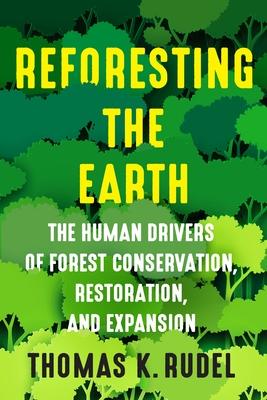Forests offer a natural solution to the climate crisis. Conserving and expanding them not only removes carbon from the atmosphere but also protects and fosters biodiversity. Yet the results of elite-driven reforestation initiatives have been disappointing, and in many world regions deforestation continues relentlessly.
Thomas K. Rudel examines a wide range of conservation and reforestation efforts to shed new light on the social factors that lead to success. He details effective coalition-building strategies and organizational models that have protected, restored, and expanded forests around the world. Rudel argues that successful reforestation projects bring together diverse groups of people with a stake in the land and a commitment to collective decision making. They give voice to different economic and social interests, including small farmers, Indigenous peoples, loggers, ranchers, government officials, NGO personnel, international donors, and climate activists. These varied coalition members each make commitments to promote forests. Farmers limit the extent of lands under cultivation, governments protect land tenure for smallholders, and wealthy donors make payments for environmental protections. Timely and accessible, Reforesting the Earth offers a guide to scaling up local efforts to sequester carbon and makes a powerful case for a global reforestation movement.
Book
Reforesting the Earth: The Human Drivers of Forest Conservation, Restoration, and Expansion
by Thomas Rudel
(Write a Review)
$38.89
Forests offer a natural solution to the climate crisis. Conserving and expanding them not only removes carbon from the atmosphere but also protects and fosters biodiversity. Yet the results of elite-driven reforestation initiatives have been disappointing, and in many world regions deforestation continues relentlessly.
Thomas K. Rudel examines a wide range of conservation and reforestation efforts to shed new light on the social factors that lead to success. He details effective coalition-building strategies and organizational models that have protected, restored, and expanded forests around the world. Rudel argues that successful reforestation projects bring together diverse groups of people with a stake in the land and a commitment to collective decision making. They give voice to different economic and social interests, including small farmers, Indigenous peoples, loggers, ranchers, government officials, NGO personnel, international donors, and climate activists. These varied coalition members each make commitments to promote forests. Farmers limit the extent of lands under cultivation, governments protect land tenure for smallholders, and wealthy donors make payments for environmental protections. Timely and accessible, Reforesting the Earth offers a guide to scaling up local efforts to sequester carbon and makes a powerful case for a global reforestation movement.Paperback
$38.89